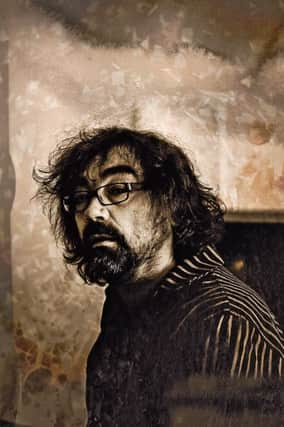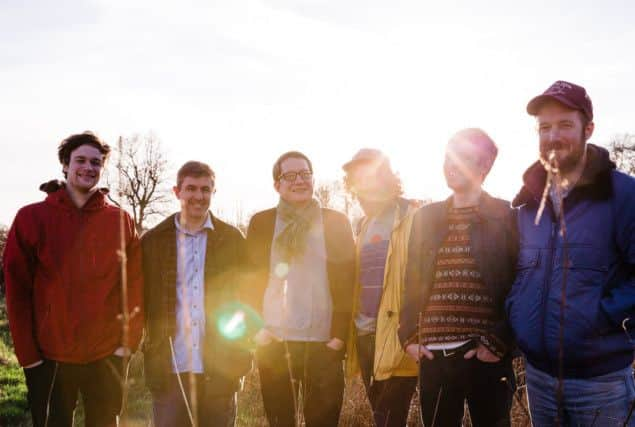Scots bands join Krautrock pioneer for Musik/Reise


It was Simple Minds who first celebrated the cultural landscape of 1970s Europe, and Germany in particular (“tragedies, luxuries, statues, parks, galleries”), through fascinated Scottish eyes on their classic electro odyssey I Travel. Now a collaborative project called Musik/Reise, which translates as Music/Travel, conceived by Alun Woodward of Chemikal Underground Records in his role as music programmer at Easterhouse arts venue Platform and supported by the Goethe-Institut, brings together three sets of musicians from Scotland and Germany who all view the musical process as a journey of sorts – just one where the destination is not always clear until arrival.
Esteemed away player Hans Joachim Irmler is a founding member and keyboard player of veteran experimentalists Faust, who first emerged in the early 1970s and stood alongside the likes of Can, Neu! and Harmonia as part of an adventurous new wave of German rock music, which was quickly dubbed Krautrock after a Faust song of the same name. He has been invited to improvise and create a new performance work with Stuart Braithwaite and Martin Bulloch of Mogwai and Duncan Marquiss and Andy Wake of The Phantom Band, all of whom freely admit the influence of Krautrock on their own sound and style.
Advertisement
Hide Ad“Our music is organised after the fact and it all starts from either one person or all of us mucking about,” says Braithwaite. “I don’t think we ever have an idea for a song and then go and play music; I think we just play music and turn it into an idea for a song. I think all the musicians I like are winging it most of the time.”


Braithwaite recalls a previous collaboration with Damo Suzuki of Can as “one of the most amazing musical experiences I’ve ever had. Something about being put on the spot with people that have big imaginations is always conducive to a good experience. Faust were always pretty different from the generic idea of Krautrock as a four-four motorik machine. They were always a bit more free-form than that.”
It turns out the admiration is mutual. Mogwai have steadily built an international reputation over the past 20 years as a dynamic instrumental band who pursue their own musical path. “I like the way they make music,” says Irmler. “It’s more symphonic opus than song.”
Fellow Glaswegians The Phantom Band, who release their fourth album, Fears Trending, later in January, also use improvisation as a starting point for navigating through the contributions of their six members. They have often been described as Krautfolk in an effort to encapsulate their audacious spectrum of sound, though Irmler is less familiar with their work. “Are they Scottish too?” he asks. “I’m from Swabia [a historical region of southwest Germany] so this will fit very well. We once had a driver from Scotland and from the first moment I met him I felt he was part of my family.”
Like Braithwaite, Phantom Band guitarist Duncan Marquiss is a confirmed fan of Krautrock’s liberated approach to music and composition. “If you’re interested in the expanded possibilities of rock and pop music, or what limits it’s been taken to by other people, then you’ve got to listen to the Krautrock guys,” he says. “I don’t feel that many people have gone much further than some of those bands did in the 60s and the 70s. I know Werner Herzog and a lot of the film directors who were coming up in that era, that post-Second World War generation, spoke about feeling as if they were fatherless, but you could see how that would be liberating creatively. I feel there was something about that generation of musicians in that place with that equipment; they did something with the template of rock music that no one else could have done. It seemed quite punk before punk was there. It had a non-hierarchical approach to writing.”
Faust (named after the German for “fist”) formed in Hamburg in 1971, and set up base in a countryside retreat where they could tinker undisturbed. At the time, Irmler built his own synthesizer because he couldn’t afford to buy one. Forty years later, he still plays it. “I always travel with my own equipment,” he says. “It’s easy to express myself via this instrument.”
Advertisement
Hide AdSuch art rock experimentalism was happily indulged by Faust’s first label Polydor until the poor sales figures rolled in. Next, they were gladly picked up by a young hippie entrepreneur called Richard Branson for his budding Virgin Records. “We thought it might be good starting fresh with a fresh label,” says Irmler. In its early days, Virgin was regarded as a specialist in Krautrock, and an odds and sods collection, The Faust Tapes, did well given its avant-garde content, thanks to Branson’s business gambit of selling it for the price of a single.
But the honeymoon didn’t last. The band split in 1975 following Branson’s rejection of their fifth album and the members largely disappeared from view, though Irmler continued to perform in multi-media extravaganzas around Hamburg. When the group reactivated in the early 1990s, Irmler produced and released their new music on his label Klangbad, including Faust – Live In Edinburgh, a recording of their heavy duty industrial performance at the 1997 Flux festival which literally made sparks fly and smoked out the audience. Since the mid-2000s, two versions of Faust have cautiously co-existed; Irmler’s band released their most recent album, Faust Is Last, in 2010.
Advertisement
Hide Ad“Music to me is more sound, it’s melodic noise,” he says. “Finding out where is the border between noise and melody is what I’m interested in still, after all these years. If you’re not really into pop music, it’s always about finding out something new, so I hope these three bands can find a way to make something possible if only for one moment.”
Irmler, who will also perform a set of his own material and take part in a Q&A session at Platform, is enthused about this Scottish trip. “We have two days, which is enough to make music,” he reckons. “You know how life is – there are always deadlines.”
But given that the musicians have yet to convene (that will happen later this week) and can hardly discuss a piece of music which doesn’t exist yet, it’s impossible to say where this Musik/Reise will take them or their audience.
“Because the Krautrock bands reflected their time and context, then perhaps that’s what we need to look to now,” ventures Marquiss. “So the hope for this collaboration is that it can be of its time as opposed to nostalgia or a pastiche.”
“I’ve no idea what’s going to happen,” says Braithwaite. “I’d like to think that the real spirit of Krautrock is just to do something a little bit unpredictable. It could be heavy metal reggae for all I know. We’ll just see what happens.”
Musik/Reise, Platform, Glasgow, Saturday. A bus leaves from Monorail in Glasgow at 6.30pm. www.chemikal.co.uk